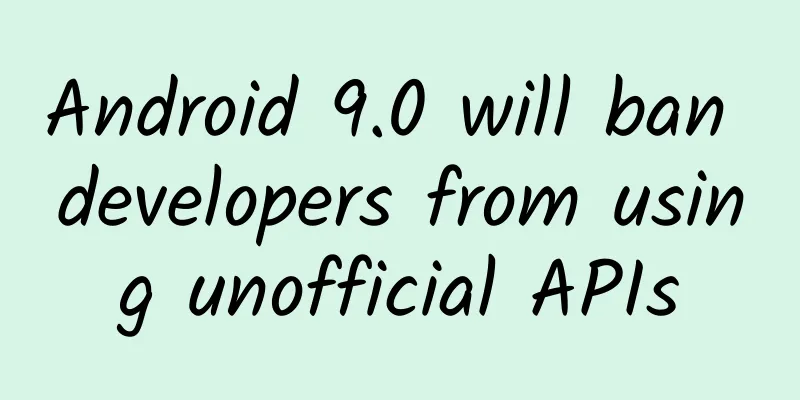Android 9.0 will ban developers from using unofficial APIs

|
According to the developer forum XDA, a recent submission report in the Android Open Source Project (AOSP) found that Android 9.0 may restrict applications from accessing undocumented APIs in the Android SDK. Let's first explain what API (Application Programming Interface) is. Let's take a simple example, such as Weibo's public API. Developers can get Weibo data based on these API interfaces, and then develop a third-party Weibo client. Developers only need to call these interfaces directly from the program without having to consider how to implement this function. For developers, this is something very useful. The Android Software Development Kit (SDK) provides developers with the API libraries and tools they need to test and build new Android applications. With each new version of Android, there are a series of new APIs available for developers to use through the Android SDK. However, this development kit is managed by Google, and not all APIs are submitted to Google. Many useful APIs are not authenticated or are directly hidden. Now many forums or forums for gamers have many software developed by individuals using these APIs. But with the update of Android 9.0, Google may completely ban access to hidden APIs. The most obvious change brought about by this trend is that the Android system may reduce a lot of auxiliary functional software developed by third-party developers in the future, such as some ad-removal plug-ins, button mapping, sign-in assistants, etc. In fact, Google started to clean up such software in the Play Store in November last year. Indeed, many people use this type of API to create some malicious software with viruses, but most applications without authentication APIs are benign. They are also a platform for Android developers to show their creativity and promote the development of the Android system. For example, the early status bar immersive plug-ins have now been integrated into the system by major Android phone manufacturers. Android's openness is a double-edged sword. We understand that Google may lock access to all hidden APIs in Android P to protect users from junk applications that abuse these APIs. But does Google need to carefully consider whether to limit Android's openness? A developer on the XDA forum bluntly said that the Android system is now more and more like a second iOS. |
<<: [Highly recommended] Four online tracking services to help you identify application anomalies
>>: Will the mobile phone system be updated? This is actually a big question
Recommend
WM Motor's new energy vehicles were cancelled due to battery problems, which not only overdrawn consumers' confidence in the industry
A Mustang new energy vehicle caught fire while cha...
Hot courses on Weibo and Baidu, optimization suggestions on Weibo and Baidu (updated)
Hot courses on Weibo and Baidu, optimization sugg...
Operational tips: In the early stage of promotion, should we use WeChat or App?
The author of this article is Qianniu Xujin, form...
Is lying really related to the nose? Everyone is Pinocchio!
I believe everyone has heard of the fairy tale &q...
Here are the 4 essential skills for new media writing!
The popularity of WeChat has also brought about a...
Information flow delivery: How to improve the low click-through rate of creatives?
I believe that everyone often encounters various ...
A new turning point in the online drama industry from Sohu's self-produced drama "The Hypnotist"
The exclusive drama "The Hypnotized Hypnotis...
vivo TWS Neo review: The price is halved and the configuration is upgraded, a bucket-shaped true wireless headset rarely seen in the market
In September 2019, vivo launched its first true w...
Advertising monetization: detailed explanation of advertising display forms and monetization!
With the changes in the current economic situatio...
Dingxiang Doctor APP Promotion Analysis Report
How is an excellent product designed, what princi...
9 Strategies for Optimizing E-Commerce Product Details Pages
Consider the following scenario: Let’s say you ar...
4 channels and 5 tools for Taobao promotion
Four major channels: official Taobao activities, ...
Mercedes-Benz to build plant in Hungary to meet electric car production needs
Recently, foreign media reported that Mercedes-Be...
Nature: The more you exercise, the smarter you are! Mice lying flat grow more brain cells
Coffee in the left hand and "happy water&quo...
Read the full text of Chen Mangge and Ye Nanxian for free, and the latest ending of Chen Mangge and Ye Nanxian!
A fire burned away all of Shen Mangge's love ...









